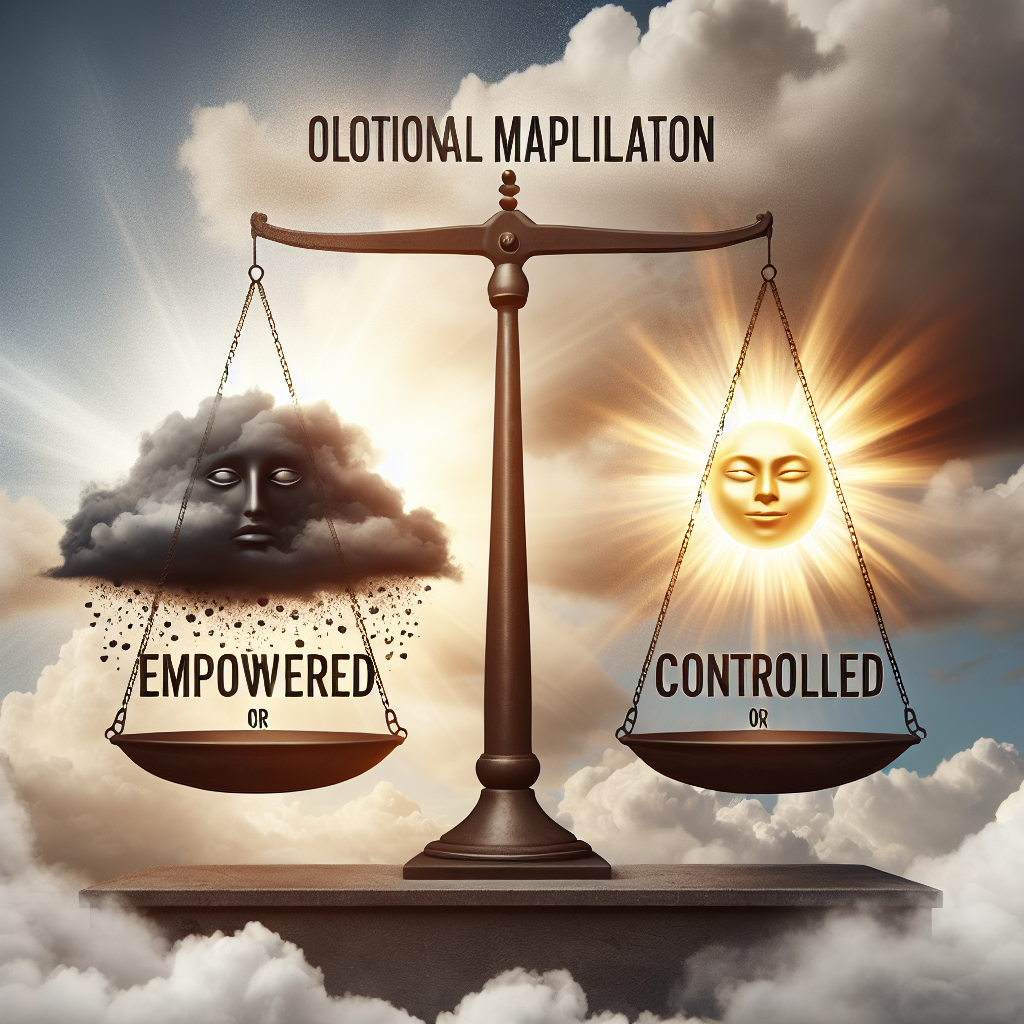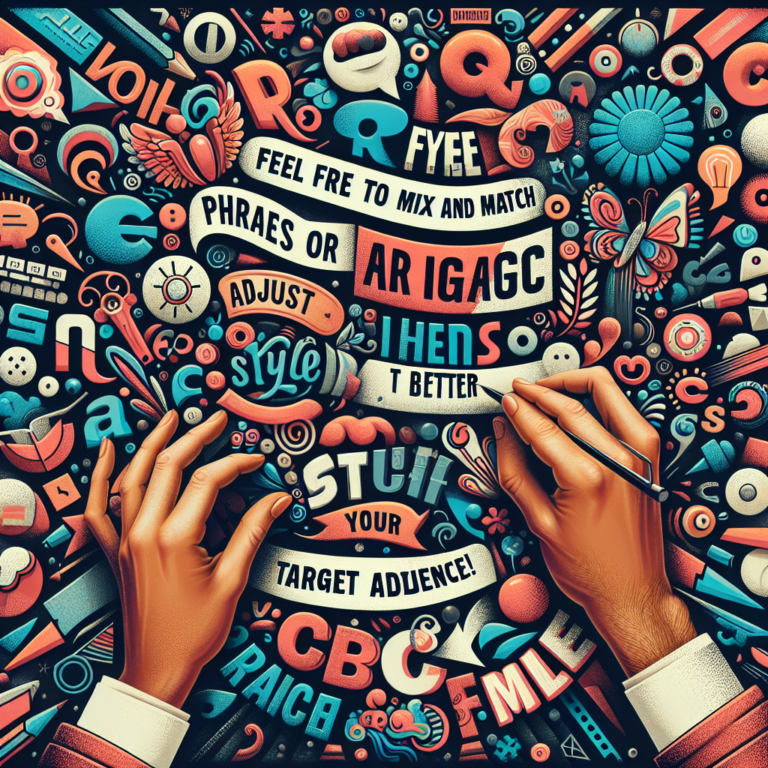
Empowered or Controlled? Learn to Recognize Emotional Manipulation in Your Life
Introduction
Have you ever felt a sense of unease in a relationship but couldn’t quite put your finger on why? Emotional manipulation is a subtle and often insidious force that can take hold of our lives, leaving us feeling disempowered and confused. In today’s fast-paced world, understanding the dynamics of emotional manipulation is not just beneficial—it’s essential for maintaining healthy relationships and safeguarding our emotional health.
In this article, we will explore the ways emotional manipulation manifests in various relationships—whether with partners, friends, or colleagues—and, more importantly, how to recognize it. By learning to identify the signs of emotional manipulation, you can reclaim your power, enhance your emotional intelligence, and create a life where you feel empowered instead of controlled.
Why Emotional Manipulation Matters
The effects of emotional manipulation can be severe, leading to anxiety, self-doubt, and a distorted sense of reality. Studies show that many people experience emotional manipulation as a routine part of their lives, often without recognizing its presence. In this article, empowered or controlled? Learn to recognize emotional manipulation in your life. This process begins with awareness, setting the stage for healthier interpersonal dynamics.
What Is Emotional Manipulation?
Emotional manipulation is a form of psychological coercion where an individual uses tactics to gain control or influence over another person’s feelings and thoughts. The manipulator may use guilt, fear, or other emotional appeals to redirect the emotional landscape in their favor. Recognizing the subtle signs of this behavior can often feel like reading between the lines, as the manipulator rarely shows their true intentions.
Signs of Emotional Manipulation
- Guilt Tripping: Saying things like, “I can’t believe you would do this to me,” is a classic guilt-trip technique.
- Gaslighting: Manipulators will often make you question your reality or perceptions. “You’re just being overly sensitive,” is a common phrase to brush off legitimate feelings.
- Playing the Victim: They may constantly portray themselves as the victim to elicit sympathy and gain control over you.
- Conditional Love: Love or acceptance is shown only under certain conditions, leaving you feeling like you must earn affection.
- Intimidation: Subtle threats or aggressive behavior used to evoke fear can be a means of control.
Case Studies
Case Study 1: The Guilt Tripper
Scenario: Sarah often found herself feeling guilty for not spending enough time with her friend Lisa. Whenever Sarah expressed a desire to do something on her own, Lisa would say, “I guess I should just get used to being alone all the time.”
Analysis
Sarah’s relationship with Lisa exemplifies emotional manipulation through guilt. Recognizing this, Sarah took the initiative to set boundaries with Lisa, asserting her need for personal space and activities. By doing so, she began to feel empowered instead of controlled by the guilt Lisa imposed.
Case Study 2: The Gaslighter
Scenario: Mark consistently questioned Julie’s memories and feelings, often dismissing them as unfounded. “You’re making that up; that’s not what happened,” he would say during arguments.
Analysis
This situation represents gaslighting, where Mark denies Julie’s reality. By acknowledging this manipulation, Julie sought therapy to work on her self-esteem and trust in her perceptions. This journey helped her feel more empowered, leading her to eventually end the toxic relationship.
Chart: Common Manipulative Tactics
| Tactic | Description | Example |
|---|---|---|
| Guilt Tripping | Making someone feel responsible for another’s feelings | "If you cared, you would…" |
| Gaslighting | Causing someone to doubt their perceptions | "You’re overreacting; that never happened." |
| Playing Victim | Shifting blame and eliciting sympathy | "I would never have done that if you hadn’t…" |
| Conditional Love | Withholding love and affection based on behavior | "I only love you when you’re like this." |
| Intimidation | Using fear tactics to control someone | "You wouldn’t want to see what happens if you do that." |
How to Recognize Emotional Manipulation in Your Life
Identifying emotional manipulation isn’t always straightforward. It requires paying attention to patterns in your interactions and reflecting on how they impact your emotional state.
1. Trust Your Instincts
If something feels off, give weight to that feeling. Our instincts often pick up on emotional manipulation long before we can articulate it.
2. Communicate Openly
Discuss your feelings with a trusted friend or therapist. Sometimes, an outside perspective can help clarify the dynamics you’re experiencing.
3. Set Boundaries
Establishing and maintaining clear boundaries is essential to resist emotional manipulation. Make it clear what behavior you will not tolerate.
4. Educate Yourself
Knowledge is power. By learning more about emotional manipulation, you become better equipped to recognize it when it occurs.
5. Stay Assertive
Being assertive means expressing your needs and feelings directly and respectfully without being aggressive. This approach makes it harder for manipulators to take control.
The Power of Emotional Awareness
Understanding the ways emotional manipulation operates in your life can help you foster stronger relationships built on trust and respect. To become empowered rather than controlled, the first step involves developing emotional awareness.
Emotional Intelligence and Its Role
Emotional intelligence (EI) refers to the ability to recognize, understand, and manage your emotions while recognizing and influencing the emotions of others. Studies indicate a strong link between high EI and resilience against emotional manipulation.
How to Develop Emotional Intelligence
- Self-Awareness: Regularly assess your feelings and reactions. Journaling can be an effective tool for self-reflection.
- Self-Regulation: Practice controlling your emotions, particularly in challenging situations. Take deep breaths, count to ten, and try to respond thoughtfully rather than react impulsively.
- Empathy: Develop the ability to understand others’ emotions. This can help you identify when someone is trying to manipulate those emotions for control.
- Social Skills: Enhance your communication and interpersonal skills. Engaging in social situations helps sharpen your sensitivity to the emotional dynamics at play.
Conclusion
Confronting emotional manipulation starts with awareness and ends with empowerment. As you navigate your relationships, remember that they should enhance your well-being, not diminish it. Empowered or controlled? Learn to recognize emotional manipulation in your life is not just a mantra, but a guiding principle for fostering healthier and more fulfilling relationships.
Arming yourself with the knowledge from this article can serve as a catalyst for change. You have the power to reclaim your emotional landscape—recognize manipulation when it appears, set boundaries, and ensure your relationships are based on trust, respect, and authenticity.
FAQs
1. What are some common signs of emotional manipulation?
Common signs include guilt-tripping, gaslighting, playing the victim, conditional love, and intimidation. Recognizing these behaviors is the first step toward addressing them.
2. Can emotional manipulation happen in friendships?
Yes, emotional manipulation occurs in friendships, not just romantic relationships or work settings. Friends can use similar tactics to exert control over each other.
3. How can I confront someone who is manipulating me?
You can confront someone by calmly expressing your feelings and the specific behaviors you find troubling. It’s essential to communicate assertively without resorting to aggression.
4. What if I’m not sure if I’m being manipulated?
Trust your instincts; if something feels off, investigate the dynamics at play. Discuss your feelings with a trusted friend or seek professional guidance to gain perspective.
5. Is it possible to repair a relationship that involves emotional manipulation?
It is possible if both parties are committed to recognizing harmful patterns and fostering healthier communication. Therapy can facilitate this process, but both individuals must be willing to work on the relationship.
By thoroughly understanding emotional manipulation, you empower yourself to build and sustain relationships that affirm your worth and nurture your emotional health. Don’t allow manipulation to overshadow your life; take charge, educate yourself, and live empowered!















